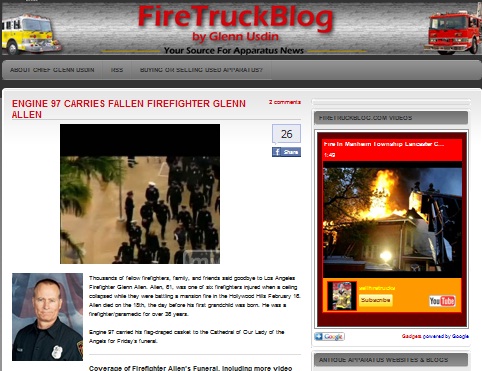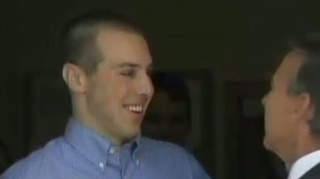Social media & the line-of-duty-death: Racing against Facebook & not always winning.
In about 1983, when I was working at WTOP Radio in Washington, DC, I covered the murder of a businessman as he made a deposit of the day’s receipts at a bank at 8th & H Streets, Northeast. A Metropolitan Police Department PIO released the name of the victim which I dutifully reported over the airwaves of the all-news radio station in the Nation’s Capital during afternoon drive-time. The next day I received a call from the dead man’s adult son who was rightfully not very happy to have heard that awful news for the first time from me. I wasn’t very happy either. In fact, I felt quite ill.
Even though it was an apparent mix-up in the police department’s internal communications, I became very sensitive about notification issues. I don’t want to be the person telling someone about the death of a close relative. Apparently other people don’t feel that way. Yesterday, there was a good example.
 Baltimore City Police Officer Tommy Portz Jr. was pronounced dead at 10:22 AM after his police cruiser ran into the back of Baltimore Fire Department’s Engine 8. Many members of the local news media knew that Officer Portz was dead. I had even heard it from sources though I was sitting inside my home in Virginia. But, to my knowledge, none of the mainstream media reported the death until it was officially announced by Baltimore Fire Department Chief Jim Clack at around 1:30 PM. That’s also when I reported it.
Baltimore City Police Officer Tommy Portz Jr. was pronounced dead at 10:22 AM after his police cruiser ran into the back of Baltimore Fire Department’s Engine 8. Many members of the local news media knew that Officer Portz was dead. I had even heard it from sources though I was sitting inside my home in Virginia. But, to my knowledge, none of the mainstream media reported the death until it was officially announced by Baltimore Fire Department Chief Jim Clack at around 1:30 PM. That’s also when I reported it.
Generally speaking, the mainstream media is very cooperative about withholding death information when there is a legitimate next of kin notification issue. I recall the Baltimore media doing it on September 11, 2002. Yes, 2002. That was the day Baltimore Colts quarterback Johnny Unitas died. Big news in Baltimore, but the media held it until they were sure the Unitas’ children were notified.
Somewhere around 11:30 yesterday morning, minutes after I received an email the officer had died, I saw a posting on Facebook with the same information. It wasn’t too long before the officer’s name was added to the report. Baltimore Sun reporter Justin Fenton acknowledged this issue in a Tweet he sent while waiting for the official notification at that 1:30 press conference outside the R Adams Cowley Shock Trauma Center:
10/20 at 12:51 pm: justin_fenton: Word spreading on facebook of officers condition thats contrary to official reports. social media rearing ugly head or best source for info
I have no information that relatives of Officer Portz found out about his death through Facebook or other social media. But for the last couple of years I have heard anecdotal information from fire chiefs who have had to deal with line-of-duty-deaths that this has become a big issue to contend with. I’ve been told stories of trying to get to the next-of-kin before the Internet does. There are also cases where rumors about how the person died are discussed on social media before a chief has even had his first briefing on the details of the death.
I imagine that most people posting this information, if they had given any thought to this issue, would not want to be the source of a child finding out about the death of a parent or a wife learning of her husband’s sudden passing. The problem, of course, is that everyone is a reporter these days and have the tools to publish in the palms of their hands. Ethics, responsibility, standards and common courtesy are not requirements for opening a Facebook account or writing a blog.
Justin Fenton posted an article on the Baltimore Sun’s website last night about this issue and tells how the Baltimore Police Department lost the race with Facebook in the death of another officer this past weekend. Here’s an excerpt:
When off-duty Baltimore Police Detective Brian Stevenson was killed Saturday night after being struck in the head by a piece of concrete, word spread quickly through police circles and spilled onto Facebook, where the officer’s young daughter learned of his death before relatives could break it to her in person.
On Monday, Officer Tommy Portz was killed instantly when his vehicle struck a fire engine on U.S. 40. For more than two hours, officials said Portz was in “extremely serious condition” as they worked to locate his family — even as memorials popped up online from those who already knew the accident was fatal.
As social media reach almost every corner of our lives, they’re also affecting the way we learn about death. Memorials on social networking sites spring up almost instantaneously, upending the traditional flow of information in situations where privacy and respect for family members have long been valued — in the killings of soldiers, and for victims of airplane crashes and natural disasters, for example.
Police departments are grappling with this shift when dealing with the deaths of officers and homicide victims. They want to be the first to inform relatives, visiting their home or contacting another department if they are too far away to reach. It’s one of the most sensitive tasks they must perform, and police sometimes withhold the name of a murder victim from the public for weeks if a relative can’t be reached.







